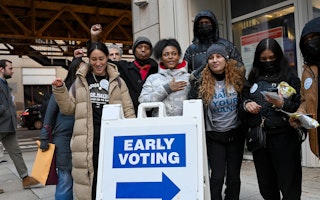Open Society Institute–Baltimore Responds to Killing of Freddie Gray, Announces Baltimore Justice Fund
All proceeds will support interventions to improve police accountability and increase racial justice and opportunity for Baltimore residents
BALTIMORE—In response to the recent unrest surrounding the death of Freddie Gray, the Open Society Institute–Baltimore (OSI-Baltimore) announced today the creation of the Baltimore Justice Fund.
The Fund will support focused interventions to improve police accountability and police–community relationships, reduce the number of Baltimoreans caught up in the criminal system without compromising public safety, and engage Marylanders, especially young people, in advocacy for programs and policies to increase opportunity and racial justice.
For 17 years, OSI-Baltimore has focused on the root causes of three intertwined problems in Baltimore and the state: drug addiction, an overreliance on incarceration, and obstacles that keep youth from succeeding both inside and outside the classroom. Those seemingly intractable issues are parts of a whole, melding together to create the conditions that led to Gray’s death and subsequent anger, protests, and uprisings.
“The recent unrest stemmed immediately from the community’s broken relationship with the police and the treatment of people in Baltimore’s most vulnerable communities. While these problems are common to many cities across the country, all of us in Baltimore have an urgent need to work together to create policies, practices and relationships that are respectful, transparent and fair in our city,” said Diana Morris, director of OSI-Baltimore.
One hundred percent of donations to the Baltimore Justice Fund will support solutions that address harmful policies and practices in Baltimore, as well as the root causes of inequities that became broadly apparent with Gray’s killing, Morris said.
“At OSI-Baltimore, we know that it is impossible to address issues of injustice without also addressing the structural inequalities that hold too many of our residents in poverty and block opportunity,” Morris said. “And we know that there is a growing number of people, in Baltimore and beyond, who want to join us in addressing these root causes to bring about real and lasting solutions. By setting up the Baltimore Justice Fund, we seek to widen the ways in which people can get involved in the city’s future, as well as provide resources to deepen our collective work.”
###
As the only field office for the Open Society Foundations’ U.S. Programs, Open Society Institute–Baltimore focuses on the root causes of three intertwined problems in our city and state: drug addiction, an overreliance on incarceration, and obstacles that keep youth from succeeding both inside and outside the classroom. We also support a growing corps of social entrepreneurs committed to underserved populations in Baltimore. Before we make a single grant, we analyze the root causes of a problem and examine research and innovative practices aimed at tackling the problem. Because we aim for lasting, sustainable solutions, we engage public and private partners from the start. It is only then, with a clear picture of the problem, that we begin to focus our approach and diligently craft a road map for change. Visit us at audaciousideas.org.
Read more
Online Hate Speech
New SEC Complaint Says Meta Misled Shareholders over Myanmar Hate

A whistleblower complaint to the SEC argues that the social media giant Meta misrepresented its role in fueling violence against Myanmar’s Rohingya—highlighting the need for more platform accountability for online hate.
Civic Engagement
Bolstering Women and Youth, Linchpins of Democracy

Philanthropy has historically underfunded women and youth. Open Society’s new $50 million investment in their engagement addresses that imbalance—and builds on recent surges in civic engagement crucial to the future of American democracy.
Art and Activism
Reimagining January 6th

The insurrection at the U.S. Capitol left him in a cold sweat. Creating a comic book seemed like one way to reach people not obsessively following the news and spark activism to help defend a multicultural democracy.